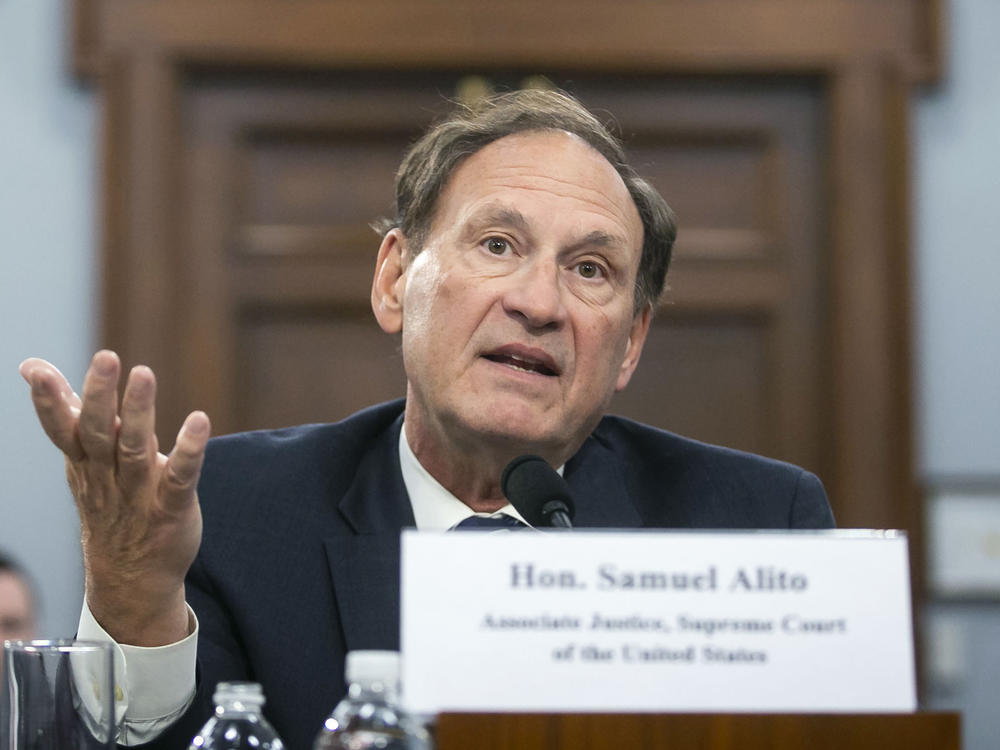Section Branding
Header Content
Justice Alito: Pandemic Has Brought 'Unimaginable Restrictions' On Freedoms
Primary Content
Supreme Court Justice Samuel Alito says the COVID-19 pandemic has brought "previously unimaginable restrictions on individual liberty," warning of an important shift in the views of essential rights on several fronts, from religious freedom to free speech.
Alito's remarks came Thursday in a keynote speech at the Federalist Society's annual National Lawyers Convention, which is being held virtually this week. The event's theme is to examine how the coronavirus is affecting the rule of law.
The COVID-19 crisis has "highlighted constitutional fault lines," Alito said.
He cautioned that his statements shouldn't be taken as a judgment on whether numerous coronavirus restrictions reflect good public policy.
"All that I'm saying is this, and I think it is an indisputable statement of fact," the justice said. "We have never before seen restrictions as severe, extensive and prolonged as those experienced for most of 2020."
"Think of all the live events that would otherwise be protected by the right to freedom of speech," from lectures and meetings to religious services, Alito said. He also noted that the pandemic has affected access to the courts and the constitutional right to a speedy trial.
"The COVID crisis has served as a sort of constitutional stress test," Alito said. "And in doing so, it has highlighted disturbing trends that were already present before the virus struck."
Shifting attitudes
The Supreme Court justice then ran down a list of examples that, in his view, reflect shifting attitudes toward long-held rights in the United States.
First on the list was what Alito called "the dominance of lawmaking by executive fiat rather than legislation" – actions that he said range from agencies' broad use of regulatory power to the use of executive discretion to impose sweeping restrictions in the name of fighting a pandemic.
Alito later cited a legal case in Nevada, saying the governor's emergency orders in that state have given leeway and support to casinos hosting gamblers at up to 50% capacity while forcing houses of worship to cap their attendance at 50 people.
"Take a quick look at the Constitution," Alito said. "You will see the free exercise clause of the First Amendment, which protects religious liberty. You will not find a craps clause or a blackjack clause or a slot machine clause."
"It pains me to say this, but in certain quarters, religious liberty is fast becoming a disfavored right," Alito said. He ran through several religion-related Supreme Court rulings, including the Little Sisters of the Poor (over providing birth control to employees) to Masterpiece Cakeshop in Colorado (over the refusal to make a wedding cake for a gay couple).
Alito made a direct connection between America's ongoing "culture wars" and the pandemic crisis, citing a 2016 blog entry by Harvard Law School professor Mark Tushnet.
"He candidly wrote, quote, The culture wars are over; they lost, we won," Alito said.
He went on to quote from Tushnet's much-discussed stance that "[m]y own judgment is that taking a hard line ('You lost, live with it') is better than trying to accommodate the losers. ... And taking a hard line seemed to work reasonably well in Germany and Japan after 1945."
Alito went on to quote Bob Dylan: "Is our country going to follow that course? To quote a popular Nobel laureate, 'It's not dark yet, but it's getting there.' "
'Hostility to ... unfashionable views'
The justice described what he called a "growing hostility to the expression of unfashionable views." As an example, he cited the Supreme Court's landmark shift on same-sex marriage.
"You can't say that marriage is a union between one man and one woman," Alito said. "Until very recently, that's what the vast majority of Americans thought. Now it's considered bigotry."
Protecting freedom of speech will be one of the Supreme Court's greatest challenges, Alito said.
"Although that freedom is falling out of favor in some circles, we need to do whatever we can to prevent it from becoming a second-tier constitutional right."
Alito also called out a group of Democratic senators who weighed in on a gun-rights case in New York, saying they had attempted to bully the Supreme Court. The group filed an amicus brief calling the court "a sick institution" that might need to be restructured. Alito said he viewed it as "an affront to the Constitution and the rule of law."
Copyright 2020 NPR. To see more, visit https://www.npr.org.
Bottom Content

